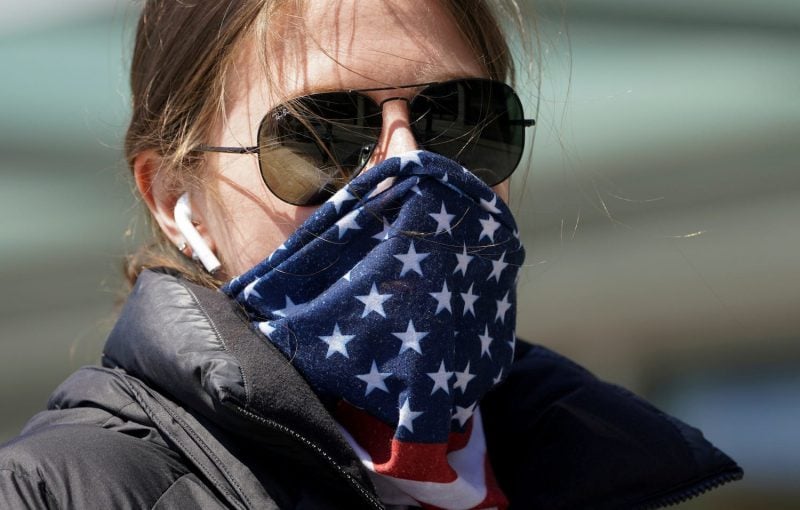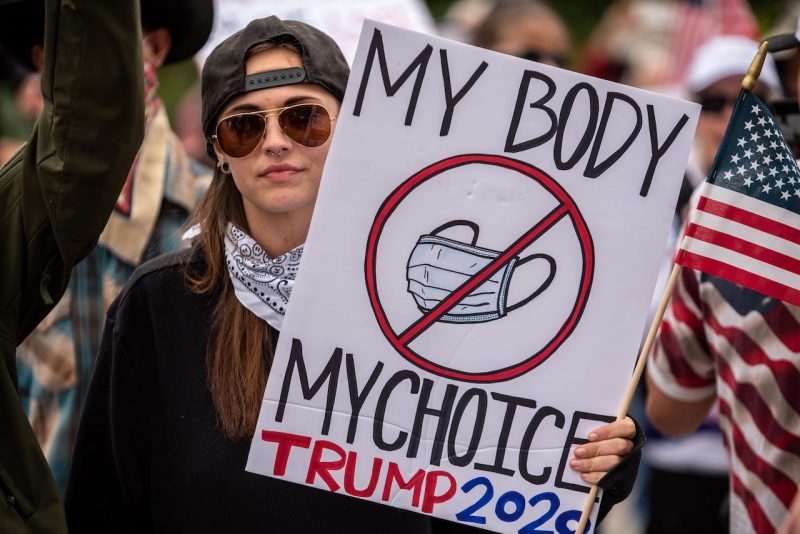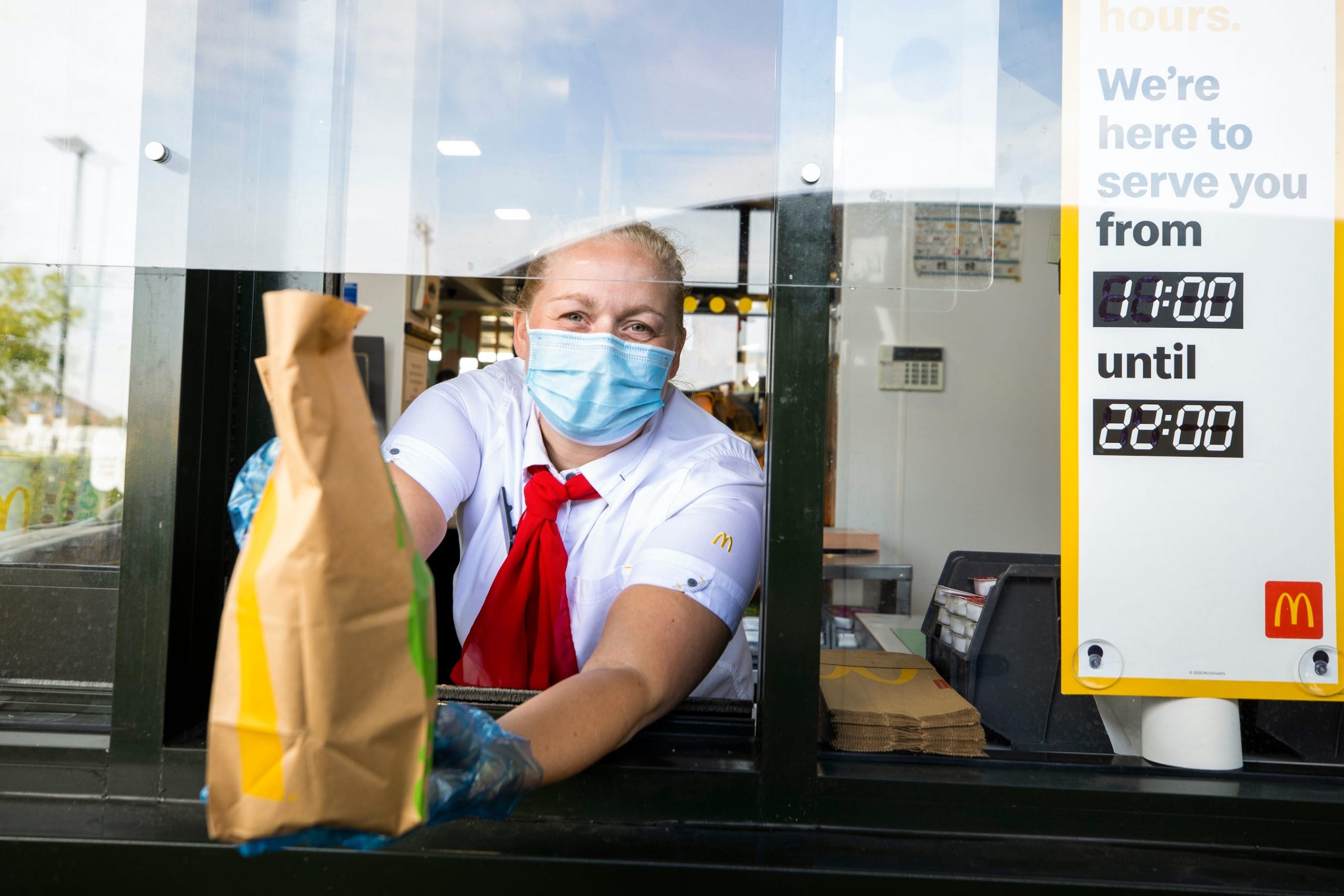- A growing body of research suggests that face masks prevent coronavirus transmission.
- But public-health officials have had difficulty enforcing mask requirements since the policy has become politically charged.
- The decision should be simple: Wear a mask; save lives.
- Visit Business Insider’s homepage for more stories.
Last month, two hairstylists at the Great Clips salon in Springfield, Missouri, tested positive for COVID-19. Between them, they’d seen 140 customers since the salon reopened. They could have been contagious the whole time. But instead of local public-health officials detecting a cluster of new cases, they arrived at a surprising finding: Of the 46 salongoers tested for the virus, not one was positive.
The most likely reason: All salon employees and patrons had worn masks.
“Which mask worked, the hairdresser’s or the client’s? I think the answer is yes. They both worked,” Robin Trotman, an infectious-disease specialist in Springfield, told The Washington Post. “The system worked. Universal masking worked.”
Indeed, a growing body of research shows masks can prevent coronavirus transmission.
A recent study from UK researchers showed that requiring people to wear face masks all the time could be enough to contain an outbreak - no lockdown necessary. The more people wore masks, the researchers found, the closer a community could get to containing its outbreak.
"These results are striking in that the benefits accrue to the face mask wearer as well as to the population as a whole," the researchers wrote. "There is, therefore, a clear incentive for people to adopt face mask wearing."
But in recent months, groups of "anti-maskers" have protested against policies that require face coverings. Some say that it impinges on their freedom, while others question the science behind it.
As US coronavirus cases jump up, and evidence continues to mount in support of mask wearing, there is no more room for this debate. Americans across the country must wear masks within 6 feet of one another - or risk endangering more lives.
Yes, masks prevent transmission
A recent analysis of coronavirus outbreaks in 42 countries found that countries where mask wearing was common, like China and Japan, saw more modest outbreaks compared with nations that weren't accustomed to the practice.
"We believe broader mask use is key to control the pandemic," the researchers wrote.
They added: "Is it not better to adopt a possibly imperfect protective measure, rather than waiting for more evidence at the expense of human lives?"
But even now, the evidence in favor of mask wearing is robust.
A model from the University of Washington predicted that the US could prevent about 33,000 coronavirus deaths by October if 95% of the population wore face masks in public.
Even if people wore masks that are only 50% effective at trapping infectious particles when they breathe, universal adoption of masks would still stop an outbreak, the UK study showed.
That research aligns with findings from Arizona State University, which showed that "broad adoption of even relatively ineffective face masks may meaningfully reduce community transmission of COVID-19."
The university's models in April determined that if nearly everyone in New York state wore a mask, up to 45% of projected deaths over two months could be prevented - even if the masks were only 50% effective. In Washington state, the model showed, face masks that are only 20% effective but worn by most of the population could still reduce mortality by up to 65%.
This information shouldn't be remarkable. We know respiratory droplets are the primary method by which people pass the coronavirus to others. A mask that covers our noses and mouths blocks those particles.
"It does have some protection for the wearer," Dr. Ramzi Asfour, an infectious-disease physician in the San Francisco Bay Area, told Business Insider. "If you think about somebody sneezing on you, there's a lot of these droplets that come out. Well, a lot of those droplets are big, and they'll easily be stopped by the mask."
Indeed, Indian researchers recently determined that a simple cloth mask "substantially decreases" the spread of virus particles when an infected person coughs or sneezes. According to their study, infectious droplets traveled about three times farther (up to 16 feet) when a person wasn't wearing a mask, compared with just 5 feet when particles leaked out the sides of a face mask.
An April study in the journal Nature also showed that surgical masks reduced the transmission of multiple human coronaviruses (not including this new one, SARS-CoV-2) through both respiratory droplets and aerosol particles.
Contradictory guidelines sowed confusion among Americans
It's understandable that people are confused about whether masks help, since all this evidence wasn't available at the start of the year. Unfortunately, that's when public-health officials had to make quick calls about whether people should be required to wear masks in public. Authorities also had to stockpile enough personal protective equipment for healthcare workers, which meant masks were in short supply.
At the start of the pandemic, the US Centers for Disease Control and Prevention did not recommend the use of face masks for the general public. Other public-health experts, including those cited by Business Insider in February, also advised that the practice was unnecessary outside China.
The recommendations were delivered at a time when the risk of infection in the US seemed low. Now the country has the worst outbreak, with more than 2.4 million cases and 122,000 deaths.
In February, scientists also hadn't learned about asymptomatic or presymptomatic cases, which are now understood to make up about 35% of coronavirus infections.
"I have anger that we didn't know in March that we should all wear masks," Lilly, a physician in Westchester County, New York, who tested positive for the coronavirus in April, told Business Insider. She requested to go by a different name because of her job. "If in March - or, even better, in February - somebody told us to wear masks and social distance, then I may not have gotten the disease."
In response to new data, the CDC on April 3 began recommending face coverings in settings where maintaining social distancing is difficult.
But the World Health Organization sowed more confusion a few days later when the group said there was no need for healthy people to wear face masks. WHO then reversed its decision and began recommending face coverings on June 5.

Some public-health experts continue to disagree about whether masks should be a requirement for the general public. When Business Insider recently asked the question to 15 leading public-health experts, 11 said masks should be worn, three were uncertain, and one said no. Robert Beardall, who cast the lone dissenting vote, said his answer stemmed from worries that homemade masks would provide a false sense of protection and lead people to get too close to one another.
But research now suggests that wearing masks improperly or sporadically could still reduce transmission - and homemade masks are better than none.
Masks have become politically divisive
On May 14, a group of 100 medical and scientific experts wrote an open letter asking governors to require cloth masks in public places, including stores, transportation systems, and public buildings. The requirement, they wrote, "could be amongst the most powerful tools to stop the community spread of COVID-19."
But many local leaders haven't enforced this mandate - and those who did faced opposition from residents.
Dr. Nichole Quick, the chief health officer of Orange County, California, resigned earlier this month after receiving threats over a mandate she issued that required residents wear face masks in public. On May 1, a security guard in Flint, Michigan, was shot and killed after asking a dollar-store customer to wear a face mask. A few weeks later, a man in Portland, Oregon, was filmed yelling at a grocery-store employee who had asked him to wear a mask inside.
Across the country, protesters have rallied against mask requirements. On May 1, the day San Diego instituted its mask rule, hundreds of protesters gathered outside a local courthouse without face coverings. Some of them held signs saying "Science is fake news" and "Trump 2020." At an April rally in Austin, Texas, protesters also called for an end to the city's mask requirement.

Trump said in an interview with The Wall Street Journal last week that he believed some Americans wear face masks to show their disapproval of him. Trump has repeatedly been photographed without a mask at public events.
Mask requirements are inconsistent across the country
Cheyenne Beyer, a 27-year-old coronavirus patient who lives in Austin, said she was worried that people who ignore mask requirements may wind up infected like her.
"My boyfriend has gone to the grocery store and the convenience store a couple of times in the past few weeks, and that even worries me because even though he wears a mask, so many people here aren't," Beyer told Business Insider. "At my infectious-disease doctor appointment today, there was a guy in the waiting room who wasn't wearing a mask at all. And then the other people in the waiting room were wearing masks, but they had their noses exposed."
Mask guidelines aren't consistent across states or counties. At least 38 states have instituted some sort of mask requirement. In California, Massachusetts, New York, Utah, Delaware, Maine, and Michigan, the mandate applies to all residents who go outdoors. Other states, like Oregon and Ohio, require masks for employees at local businesses. In North Carolina, masks are recommended for the general public, but certain cities like Raleigh and Durham require them to be worn outside.
Austin's mask requirement is still in place, though residents can't be penalized for forgoing a face covering, since the policy isn't mandatory in Texas. The city's mayor, Steve Adler, has said the penalty for not wearing a mask is simply that "more people are going to die."
States with mask requirements also offer exemptions for residents with medical conditions, like asthma or chronic obstructive pulmonary disease, though people don't need to provide documentation of these illnesses because of patient-privacy laws.
The problem with this piecemeal approach, however, is that the absence of a unified national policy has turned masks into a political statement instead of what they are: an effective public-health tool.
"It's how others take responsibility for protecting you," Asfour said. "By not wearing a mask, I'm not doing my duty to protect others."
